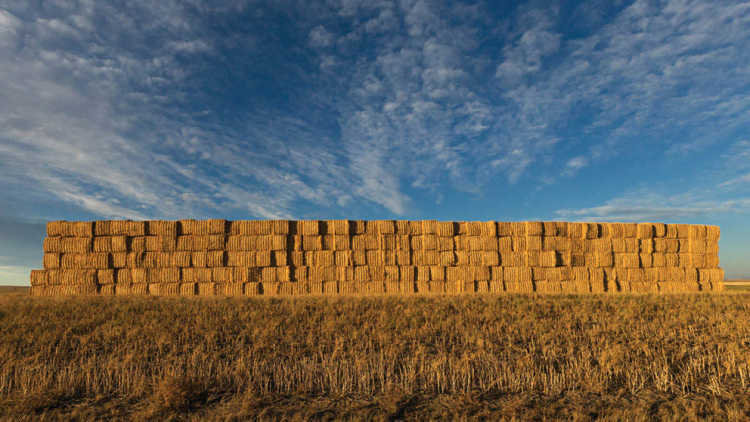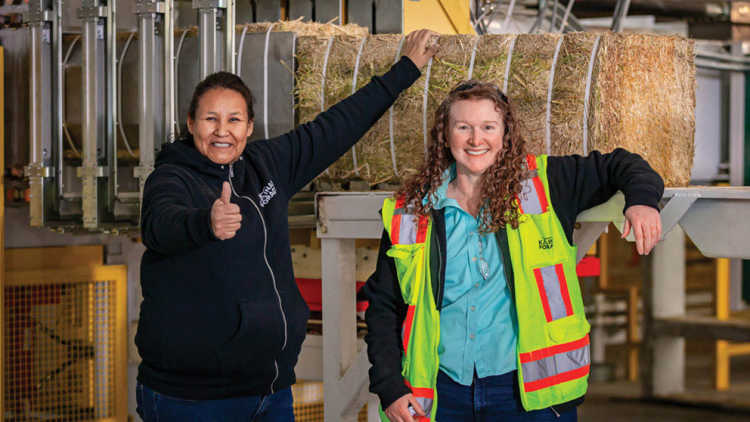Alberta’s Blood Tribe restores traditional agriculture roots

In the middle of a hot and dry summer in Western Canada, Kainai Forage in Stand Off, Alta., reports a single-day harvest of 8,000 bales of premium timothy hay.
However, the scale of success for the business is no isolated phenomenon. The joint venture between Indigena Capital, a private equity firm, and the Kainai-Blood Tribe (or Blood Tribe, a First Nation in southern Alberta) has skilfully navigated uncharted territories of both challenge and achievement since its establishment in 2019.
Growth and sovereignty
Anchored by 25,000 acres of irrigated land, Kainai Forage exports premium timothy hay internationally. A new processing plant and state-of-the-art hay press means Kainai Forage can process over 125,000 metric tonnes of hay per year and keep them on pace to continue to grow their export business.
For the Blood Tribe, the business’s success extends far beyond the boardroom.
“One of the most important principles our ancestors had was that we need to provide for our own as much as we can.”
“Sovereignty means different things to different people, different groups, and different nations, but true sovereignty can only be accomplished by greater financial sovereignty, so this is the direction that we are going with Kainai Forage,” explains Chief Roy Fox.
Ensuring a sustainable future for his community has always been at the core of Chief Fox’s career. Also known as Makiinima, he has been in a leadership role with the Blood Tribe for most of his adult life.
“One of the most important principles our ancestors had was that we need to provide for our own as much as we can – we have to be prepared to work and engage in partnerships with others and in that way, those endeavours will become more meaningful and we’ll be able to provide more,” he explains.
Grassroots agriculture
Situated south of Calgary, the Blood Tribe has the largest reserve in Canada, encompassing over 350,000 acres, and a membership of over 12,000. They were early agriculturalists, but their initial success in the industry was constricted.
“When big farming came about, they could not access the necessary capital to be engaged fully,” Chief Fox says. “But they continued – they did not give up, even though sometimes it seemed insurmountable barriers were in their way.”
In the 1980s, the tribe negotiated the irrigation project with Canada and Alberta and reached an agreement in the 1990s. However, in their forage business's early days, they faced challenges.
“We knew that there were crops we could develop on our lands and be successful. We saw the opportunity to really expand but we couldn’t do it ourselves.”
World-class partnership

By partnering with Indigena Capital, which specializes in partnerships with Indigenous Nations, the Blood Tribe has taken that world-class opportunity and built a world-class business.
And that business growth is more than just business for the Blood Tribe. “It’s the degree of financial sovereignty a nation has that determines the true growth and promise of a nation,” Chief Fox explains. “The Kainai tribal government does not have the same resources as other governments – they have a tax base, we don’t. We have to strive much higher to provide different resources and services for our membership, so the most logical way to achieve that is to have long-term economic and business sustainability.”
“We have great opportunities within our land and through our resources and it is so important that we find good business partners who provide those things that we don’t have,” he says. “Private equity provides the dollars and the expertise; we provide the opportunity. We need each other.”
How to make a good business partnership work
Assemble the right skillsets
A good balance in collaboration is key, with both parties having confidence in the skillsets they bring to the partnership, and what they need out of it. “There is a biological relationship in nature when two animals live off each other and become stronger – symbiosis. We have to think in those terms whenever we are talking about collaborating with others,” Chief Fox says. “We know that we can do our part and we like to think that our partners are always doing their part.”
Gather consensus on goals and expectations
Common goals cultivate compatibility, but business partners need to be ready and able to shift gears together as goals expand and evolve. New facilities for Kainai Forage will result in 70 new full-time positions for the business. Drawing on their partners’ perspectives has helped Kainai Forage keep pace with that growth. “We need that collaboration. We would not have come this far in the development of Kainai Forage without their involvement. By taking advantage of business opportunities and going into good partnerships, we both grow.”
Build a team with trust and integrity
Growing up an avid hockey player, Chief Fox knows a lot about teamwork. “There has to be that atmosphere of trust amongst us,” he says. Transparency builds trust among business partners; intentions and aspirations need to be clearly communicated, especially in high-stakes relationships. The first line of responsibility for the Blood Tribe is, after all, the socio-economic welfare of its members. The business is also Indigena Capital’s first investment under their new agricultural investment platform.
Beyond the success of Kainai Forage itself is the path it is forging for other First Nations to follow. “We can build a good model – one that perhaps others can utilize,” Chief Fox says.
From an AgriSuccess article by Emily Leeson.

In this episode, Marty chats with fellow CWA Top 50 Influential in Ag winners about strategic planning, digitization, mentorship, and the future of agriculture.
